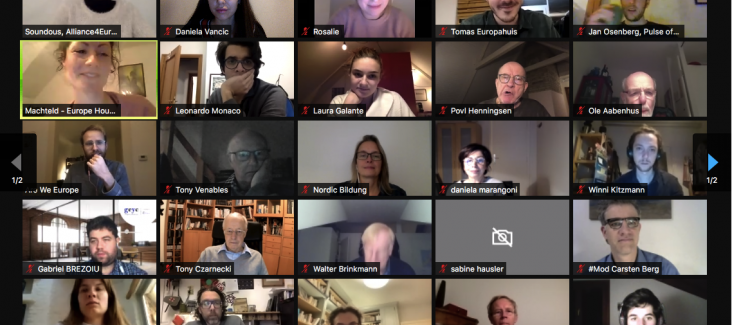The Conference on the Future of Europe is the de-facto flagship project of the Ursula von der Leyen Commission, aimed to be a “new push for European democracy.” While the Covid pandemic has not been of much help in keeping true to the timeline, political deadlocks over which individual(s) should lead the Conference have been the real reason to blame for the much delayed Conference. But citizens are not interested in the symbolic chair of the Conference - they want to discuss real issues that affect them, set priorities for Europe’s common future, and know with confidence that their concerns and ideas will be followed up and responded to. But the entire nontransparent nature of negotiations and delay of the Conference are putting a stain on the process itself and further validating the democratic discrepancies of the EU. The way the Conference is being handled is telling us a lot about the EU - and if there was ever a need to critically review Europe’s future course, it’s now.
With the Citizens Take Over Europe coalition, we have from the very start, spring 2020, monitored and put pressure on the institutions to get the Conference started as soon as possible and keep citizens center stage in the entire process. With the pandemic still restricting us from meeting face-to-face, this would have been a perfect opportunity for the institutions to have launched an online consultation with citizens to co-design the Conference and crowdsource ideas that should be on the agenda. It would have also been the perfect opportunity to take the time to invite citizens and civil society to co-design the Conference, especially on points where there are political deadlocks.
This is why we took matters into our own hands. We published 10 guiding principles for how to run a citizens-friendly Conference on the Future of Europe. The Commission didn’t launch an online public consultation for citizens, so we did, and it’s open for your participation now. We submitted a petition to the European Parliament with our demands to include citizens and civil society in a focused and structured way. You can sign it here. And we held a successful self-organized public hearing to our petition with a representative of the European Commission, with several key Members of European Parliament, and leading experts on citizens’ assemblies from across Europe.
At the public hearing, Members of the European Parliament shared the same frustrations and concerns as civil society: What will make this Conference different from any other EU sponsored democatic exercise? And the overarching question: What will happen with the results of the Conference and what will follow-up look like?
The fact that the European Parliament does not have more information than civil society in regards to the foreseen timeline solidifies even more the need for transparent negotiations. And with the Members of European Parliament we agreed: If by May there is no launch, the European Parliament should take the initiative and go forward with the Conference.
The Commission representative confirmed that the Portuguese Presidency of the Council aims to launch the Conference soon and before its Presidency expires in June 2021, and the Commission is equally eager to start it. A digital deliberative platform will be launched alongside the Conference which should allow reaching citizens for a transnational debate in real-time. This could be an opportunity to officially start the Conference in a digital, more open format to contribute to the agenda-setting phase, before beginning the deliberative discussions in randomly-selected groups of citizens.
But the Conference cannot be a one-off exercise. Beyond the Conference, there should be permanent deliberation mechanisms for regular citizens to have a say on European matters.
In a second panel, experts of citizens’ assemblies discussed and developed with us what a European citizens’ assembly could look like as a permanent mechanism, using the experience and examples we have across Europe. The first big test for this will be the Conference, as randomly-selected citizens’ assemblies are foreseen to be a main pillar in the Conference’s structure.
The Conference negotiations are certainly off to a shaky start, but civil society is still hopeful and ready to support the Conference, as long as it is a real attempt to bring citizens into the decision-making room and critically look at a European democracy that is fit for the future. Until then, Citizens Take Over Europe and Democracy International as a partner organization will continue to keep our eye on the ball to make sure this Conference will be the meaningful and impactful process that was promised to be.

